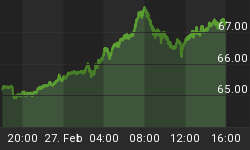So now we have all noticed that the Fed eschewed tightening a week and a half ago, and we have digested all of the analysis of the "negative dots" which indicate some member of the Fed projected not just unchanged rates but actually negative rates.
(Incidentally, here is a good article in The Telegraph about Sweden's negative rate regime. One of the observations worth pondering is that in a cashless society, there is no zero-percent floor on interest rates: normally, rates below zero percent shouldn't be possible since someone can always earn zero percent by holding cash. Unless there is no cash. That is simultaneously a deep thought and a terrifying thought - if there is no cash, and all of your money is in electronic deposits at financial institutions, then there is no limit to how much you can be robbed of - or in popular financial parlance, no limit to the "financial repression" that can be visited upon you.)
And we have read all of the analysis of Yellen's coughing spell after she appeared to express a desire to tighten in 2015 anyway, as long as it is later, and as long as - well, you know, as long as things work out. The NY Fed's Dudley today echoed Dr. Yellen; but Chicago Fed President Evans (father of the eponymous rule) opined that further delay is acceptable and desirable.
In other words, we are just exactly where we usually are. It depends. One of the great imponderables, of course, is "on what does it depend?"
For what it is worth, which to be sure isn't much, I think the Fed is terrified about that first step. If the Fed tightened and the world didn't end (and indeed, I don't think it would end; or, alternatively, judging from the stock market's behavior recently it may already be ended before that), then I think they would tighten again...and again, and again. And I think they would keep tightening until markets cracked and/or the economy swooned, whereupon they would begin a panicky easing campaign. That is, after all, the record of the last three decades or so.
This is just my opinion, of course (and this is a good place to remind readers both new and old that I endeavor to raise the right issues, and don't care as much about whether I have the right answers), but I believe if the Fed met today they wouldn't tighten rates. This isn't terribly shocking, since we are only eleven days removed from when the Fed last skipped such a step, but the salient point is that nothing about time passing should change the decision. Unless the economy displays more strength, which I doubt it will, or the FOMC abruptly decides to focus on better measures of inflation like Median CPI, which I doubt it will, there is no reason for the Fed to tighten in 2015 just because it happens to be 2015. Ergo, I don't think the Fed will tighten in 2015.
That being said, I think they will continue to talk about tightening until a short time before they decide to ease. The hurdle to ease may be higher than it was for QE3, but it is still much lower than the hurdle for tightening. But they will talk like hawks because for some reason the Federal Reserve believes that talking about tightening gives them credibility.
Now, there is no reason to actually do any more QE. If the Fed wanted some more stimulus, then the right approach is to do what the "negative dots" imply, and that is to lower the interest paid on excess reserves to a penalty rate. I want to point out that I first wrote about this in 2010 in an article entitled "Being Negative Might Be A Positive." So it isn't a new idea. Do I think the Fed will lower IOER to a negative rate? Not really, but either this or another round of QE is likely if the Fed becomes convinced that the economy is turning south. Historically-speaking, of course, the Fed tends to arrive fairly late to that conclusion so I don't expect QE very soon!
You can follow me @inflation_guy!
Enduring Investments is a registered investment adviser that specializes in solving inflation-related problems. Fill out the contact form at http://www.EnduringInvestments.com/contact and we will send you our latest Quarterly Inflation Outlook. And if you make sure to put your physical mailing address in the "comment" section of the contact form, we will also send you a copy of Michael Ashton's book "Maestro, My Ass!"















